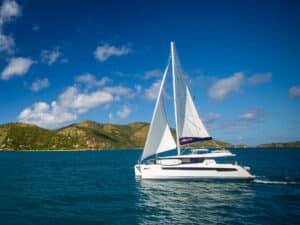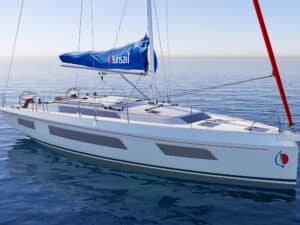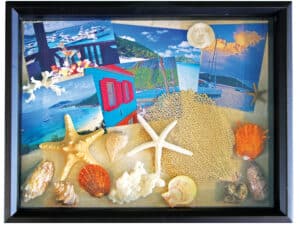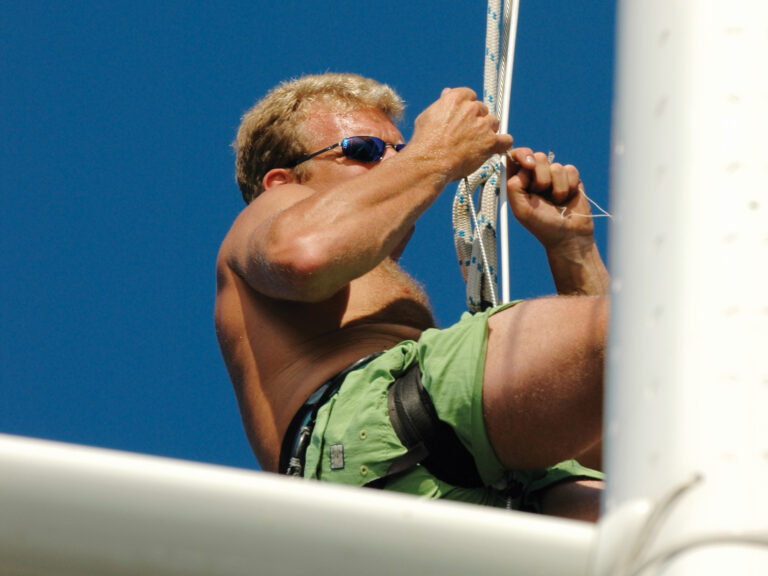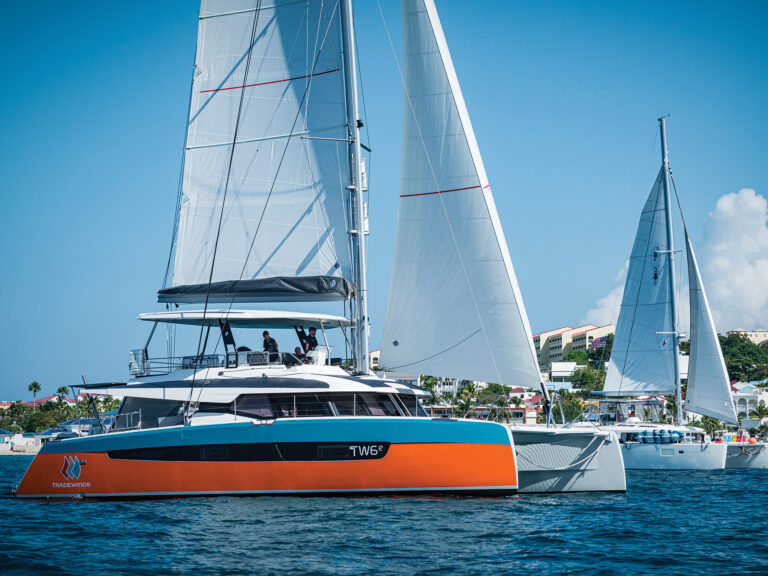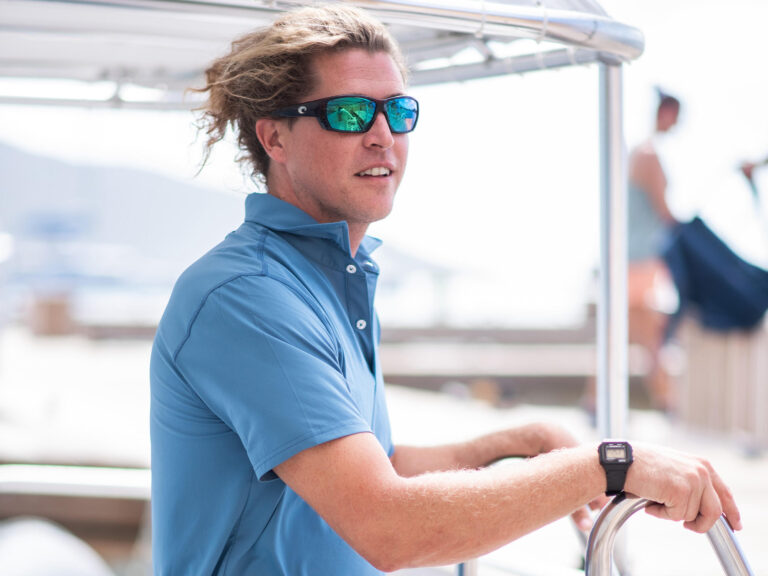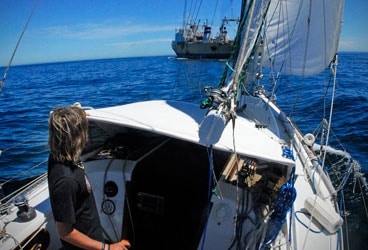
POV 368
In one mid-July week of 2009, we celebrated both the 40th anniversary of the first man on the moon and the solo circumnavigation of 17-year-old Zac Sunderland, deemed the youngest sailor ever to carry out that feat.
I was asked to write about his voyage from my perspective. It makes sense; I also was once featured in a coming-of-age story about a daughter who survived her father’s plan to kick his pain-in-the-neck 18-year-old off to sea and around the world.
Interest in my whole yarn would’ve fizzled as fast as the post-moon-landing NASA budget if I hadn’t written a book about it that’s still in print, with updated editions. Twenty-two years later, I’m still writing, this time about Zac.
A little over one year ago, an e-mail came to me containing a press release about a 16-year-old boy preparing to set sail on his first passage across the Pacific Ocean from Los Angeles. Zac and I talked on the phone, and then I wrote a piece about how cool it was to see him confidently turn a larger-than-life dream to reality in a youth culture driven by commercial definitions of “real.” Then I got back down to living life with my own teenagers.
We’re Vermont hill dwellers, not connected by a cellphone or Facebook. My own website has been, ahem, “under construction” for years. So updates on Zac’s progress would filter to me via friends or snippets in the one sailing magazine I receive-until that auspicious mid-July week. To bone up to deliver the requested perspective, I started Googling Zac, whose name, at that moment, got 1.98 million hits.
This is what I found.
From a packaged press release that’s been recycled a million times over, we learn that a childhood spent sailing with the family and the story of Jesse Martin (the nonstop Australian solo circumnavigator who finished his trip when he was 18 and wrote Lionheart: A Journey of the Human Spirit) inspired Zac to sail around the world himself while making stops and to become the youngest ever to do so.
We read about how he used $6,000 saved from summer jobs to buy an Islander 36 and spent months of 18-hour days with his father refitting her.
We learn that his parents were highly involved in the planning and supportive all along; that while under way, Zac called home every day; that his father met him at most stops to help fix things before Zac continued on.
From blog updates, we learn that he had rough weather, a broken boom, engine problems, and a fright whilst dodging some suspicious types off Indonesia. His larger mission, we’re told, was to become an example to teenagers needing to know that they’re capable of so much and that no dream is impossible. Mission accomplished. Bravo.
According to most news sources, he’s sailed into the record books as the youngest solo circumnavigator ever.
But-wait. Not really, some say. Apparently, there’s only one body officially responsible for ratifying such a record-the World Speed Sailing Record Council, established in 1972 by the International Yacht Racing Union, now the International Sailing Federation-and it isn’t recognizing Zac.
Why? Because, supposedly, he didn’t follow some prescribed circumnavigation route, and he didn’t actually sail the whole way, having used his engine at times to get in and out of harbors. Geezum! Talk about nitpicking. If enough people are saying he’s sailed into the record books-Google “Zac Sunderland record breaking” and you get 1.17 million hits-then who cares what the W.S.S.R.C. decides?
Well, actually, somebody cares, because 61,300 hits also link Zac to Michael Perham, another young solo circumnavigator who, at the time of Zac’s return, was in Panama, one passage away from buckling his own belt in the United Kingdom. At press time, his goal was certain.
Michael already earned the youngest-ever record for a solo transatlantic crossing that he did at the age of 14, sailing from the Canary Islands to Antigua while his father followed on another boat. Two years later, he started out shooting for the title of the youngest solo nonstop circumnavigator. Equipment failure led him to pull into port several times, and he’d ratcheted back his goal to beating Zac. If you’re amazed that two young boys are angling for the record at the same time-what are the chances?-be prepared to be even more amazed. I was.
My online surfing took me from Mike Perham to a 16-year-old girl in Australia. “Jessica Watson sailor” gets 35,300 Google hits, and she hasn’t even left yet. Her equally slick website and blog document her preparations for a bid for the nonstop, unassisted, youngest circumnavigator crown-on a hot-pink boat, no less. Don’t even ask about 13-year-old Laura Dekker from the Netherlands.
There’s no telling how many other kids out there think it could be them. I recently received an e-mail from a 13-year-old girl in Wisconsin asking for advice on how to get started.
Following on the heels of BJ Caldwell, David Dicks, and Jesse Martin-other slightly older youths who circumnavigated in the 1990s-Zac, Mike, and Jessica are the avant-garde sailors of the new millennium.
It could seem like it’s turning into a free-for-all, and for what? Challenge? Adventure? Records? Celebrity?
With satellite phones for daily contact with a home base, e-mail, the Automatic Identification System, chart plotters, GPS, radar, and parents who are 100 percent behind them, these sailors are fully tricked-out contenders. I’m not ancient, but the more I read about Zac and the others, the more I began to feel like I have a dinosaur’s perspective. I was also left wanting more.
Sifting through their webcam moments at sea, daily blog entries, articles full of words like “inspirational,” “adventurous,” and “record-breaking,” I keep trying to get past the bells and whistles that also got attached to my story, to the bricks and mortar of what these kids are made of, to find and articulate a perspective beyond obviously being impressed and admiring of such spirit and drive.
I remember being close to their age and engaged in a similar stunt-all in the stone age of the 1980s, when navigation was subject to the variables of weather, time, and a properly aligned sextant. Luck kept me out of the paths of ships (or not) while I slept, stops were planned around ports with an American Express office where I could get cash and with telephone or telegram offices for me to communicate with home, and news of me came from my very sporadically submitted handwritten articles that were sent by airmail using envelopes and stamps.
These memories swiftly relegated me to the old guard, the place that such proto-singlehanders as Joshua Slocum and Bernard Moitessier once held for me. I feel closer to them than to the new kids.
Back in my 35mm-photography day, talk of records and publicity made me shudder. I froze up in front of cameras and dreaded answering questions. These self-aware Generation Twitter kids are nothing like the camera-shy teenager that I remember being, one enduring the walk and dreading the talk.
What nostalgia decides to show us from the past is a funny thing. The old days weren’t necessarily better, but it compels me to want to find a more time-transcending perspective on the present.
We’ve got the sound bites, the feel-good story, and the facts, but what about Zac? What about the boy who went to sea, all alone out there for long days on long passages, when the months stretched before him into eternity?
What about him sitting in his cabin on a moonless night, alone with his thoughts, dreams, and nightmares, with the good ship Intrepid a little glow of light dwarfed by the rushing sounds of water in a massively humbling universe?
I imagine Zac in this scene, so far from everything; he’s calling home, speaking into a handset while siblings and parents are sitting at the kitchen table and waiting for him. When I juxtapose these two scenes, only then does the story start to feel real for me. But it’s a lonely feeling that isn’t easy to describe.
Here’s a boy who experienced the raw solitude and might of the ocean, nature’s last true frontier, where all the communications equipment in the world can become useless with one partially submerged cargo container in the wrong place at the wrong time, where utter fear and elation can routinely co-exist on the same spectrum, sometimes all in the same day.
How will he reconcile the minuscule self that spent 13 months alone on this equalizing sea with the swelling of the public figure that he’s become on land and in cyberspace? He left a child, he returned a man-child-in many states, he can’t legally drive a car, and he’s almost four years away from drinking a legal beer. What part of himself is he leaving behind in his wake? What will he bring into a future where records that are made to be broken won’t really matter?
This is some of what I’d ask him if we could speak to each other, but I realize that the introspection of a white-haired killjoy would dampen his moment of glory. I didn’t like fielding these kinds of questions in my moment, either; I needed years to figure out how one properly lists “singlehanded circumnavigator” on the resume.
Even with all the introspection, when the dust settled after I’d stepped out of the box in such a dramatic way, I learned that much of what happened to me out there was private, beyond language, and because of that, there was a piece of me that would always feel alone. The trip itself was just the beginning, a whiz-bang launching of the adult life journey, and the map forward was one I had to create for myself, step by step.
Zac is an unusual teenager who set an unusual goal that, as it was achieved, provided him with an unusual inner experience, one that, from any perspective, will inform his future. His outer adventure had a beginning, a middle, and an end; it was a package that’s frozen in time and can be wrapped up and presented to millions as easily as a New Jersey kid can use YouTube to show off his lip-syncing talent.
In the meantime, past all the evanescence of superficial records and publicity, wherever young Zac’s course leads from here into adulthood, the enduring core of strength that he’s earned belongs to him alone. It will always be his one true north, as mine still is for me. The circumnavigation is over, but for Zac, it’s only the end of the beginning. As he heads into the beginning of the end, I wish him another bon voyage.
When not sailing and writing, Tania Aebi tends to her gardens and livestock in Vermont.


